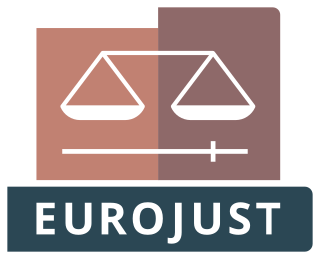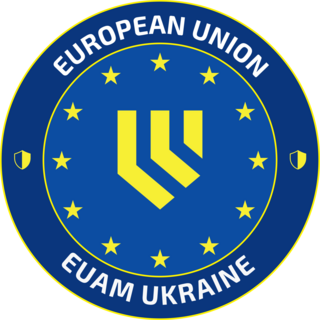
The Home Office (HO), also known as the Home Department, is a ministerial department of the British Government, responsible for immigration, security, and law and order. As such, it is responsible for policing in England and Wales, fire and rescue services in England, visas and immigration, and the Security Service (MI5). It is also in charge of government policy on security-related issues such as drugs, counter-terrorism, and ID cards. It was formerly responsible for His Majesty's Prison Service and the National Probation Service, but these have been transferred to the Ministry of Justice.

Europol, officially the European Union Agency for Law Enforcement Cooperation, is the law enforcement agency of the European Union (EU). Established in 1998, it is based in The Hague, Netherlands, and serves as the central hub for coordinating criminal intelligence and supporting the EU's member states in their efforts to combat various forms of serious and organized crime, as well as terrorism.

Between 1993 and 2009, the European Union (EU) legally comprised three pillars. This structure was introduced with the Treaty of Maastricht on 1 November 1993, and was eventually abandoned on 1 December 2009 upon the entry into force of the Treaty of Lisbon, when the EU obtained a consolidated legal personality.
- The European Communities pillar handled economic, social and environmental policies. It comprised the European Community (EC), the European Coal and Steel Community, and the European Atomic Energy Community (EURATOM).
- The Common Foreign and Security Policy (CFSP) pillar took care of foreign policy and military matters.
- Police and Judicial Co-operation in Criminal Matters (PJCCM) brought together co-operation in the fight against crime. This pillar was originally named Justice and Home Affairs (JHA)

The European Union Agency for Criminal Justice Cooperation (Eurojust) is an agency of the European Union (EU) dealing with judicial co-operation in criminal matters among agencies of the member states. It is seated in The Hague, Netherlands. Established in 2002, it was created to improve handling of serious cross-border and organised crime by stimulating investigative and prosecutorial co-ordination.

The Criminal Assets Bureau (CAB) is a law enforcement agency in Ireland. The CAB was established with powers to focus on the illegally acquired assets of criminals involved in serious crime. The aims of the CAB are to identify the criminally acquired assets of persons and to take the appropriate action to deny such people these assets. This action is taken particularly through the application of the Proceeds of Crime Act 1996. The CAB was established as a body corporate with perpetual succession in 1996 and is founded on the multi-agency concept, drawing together law enforcement officers, tax officials, social welfare officials as well as other specialist officers including legal officers, forensic analysts and financial analysts. This multi-agency concept is regarded by some as the model for other European jurisdictions.
The Committee on Civil Liberties, Justice and Home Affairs (LIBE) is a committee of the European Parliament that is responsible for protecting civil liberties and human rights, as listed in the Charter of Fundamental Rights of the European Union.

The Ministry of Justice is a ministry in the Government of Sweden responsible for policies related to combating terrorism, democracy and human rights, family law, the judicial system, migration and asylum and the Constitution of Sweden.

The Directorate-General for Justice and Consumers is a Directorate-General of the European Commission. The role of the body is to ensure that the whole European Union (EU) is an area of freedom, security and justice. The specific tasks and responsibilities of the DG are laid down by the Treaty of Rome, the Treaty of Amsterdam, which came into force on 1 May 1999, and the conclusions of the European Council meeting in Tampere (Finland), a special meeting held on 15-16 October 1999 concerned with the creation of an area of freedom, security and justice within the EU.

The Prüm Convention is a law enforcement treaty which was signed on 27 May 2005 by Austria, Belgium, France, Germany, Luxembourg, the Netherlands and Spain in the town of Prüm in Germany, and which is open to all members of the European Union, 14 of which are currently parties.
The counter-terrorism page primarily deals with special police or military organizations that carry out arrest or direct combat with terrorists. This page deals with the other aspects of counter-terrorism:
The Salzburg Forum (SF) is a Central European security partnership of Austria, Bulgaria, Croatia, the Czech Republic, Hungary, Poland, Romania, Slovakia and Slovenia. Member states cooperate in areas of police cooperation, illegal immigration, witness protection, fight against drugs, traffic safety and other areas of internal security. They also focus on positions coordination and advancing common interests in the European Union in the area of Home Affairs. At least two conferences of interior ministers per year are held. As a rule, three SF ministerial meetings are held per year. One meeting takes place in the country holding the presidency and one further meeting is usually held in summer in Austria. In addition, ministers regularly meet in the margins of EU Council meetings.
The Stockholm Programme is a five-year plan with guidelines for justice and home affairs of the member states of the European Union for the years 2010 through 2014.

The area of freedom, security and justice (AFSJ) of the European Union (EU) is a policy domain concerning home affairs and migration, justice as well as fundamental rights, developed to address the challenges posed to internal security by collateral effects of the free movement of people and goods in the absence of border controls or customs inspection throughout the Schengen Area, as well as to safeguard adherence to the common European values through ensuring that the fundamental rights of people are respected across the EU.
The Mechanism for Cooperation and Verification (CVM) is a safeguard measure invoked by the European Commission when a new member or acceding state of the European Union has failed to implement commitments undertaken in the context of the accession negotiations in the fields of the Area of freedom, security and justice or internal market policy.

The Directorate-General for Migration and Home Affairs is a Directorate-General of the European Commission. The role of the body is to ensure the EU's security, to build a common EU migration and asylum policy, and to promote dialogue and cooperation with non-EU countries. Thereby, it contributes to the area of freedom, security and justice (AFSJ).

The European Union Agency for the Operational Management of Large-Scale IT Systems in the Area of Freedom, Security and Justice (eu-LISA) is an agency of the European Union (EU) that was founded in 2011 to ensure the uninterrupted operation of large-scale IT systems within the area of freedom, security and justice (AFSJ), that are instrumental in the implementation of the asylum, border management and migration policies of the EU. It began its operational activities on 1 December 2012. The current establishing regulation entered into force on 11 December 2018, repealing the previous regulation and expanding the Agency's mandate. The new mandate strengthens the Agency's capacity to improve, design and develop information systems for European security, border management and migration, and broadens the scope of the Agency's work on research, innovation, testing and on the possibility to support the development of pilot projects and proofs of concept.

European Union Advisory Mission Ukraine is a civilian Common Security & Defence Policy (CSDP) mission of the European Union. It aims to assist Ukrainian authorities to reform civilian security sector. It provides strategic advice and practical support to make Ukrainian civilian security sector more effective, efficient, transparent and enjoying public trust. EUAM Ukraine works with a number of law enforcement and rule of law institutions of Ukraine, and it formally began operation on 1 December 2014, following Ukrainian Government's request.
The migration and asylum policy of the European Union is within the area of freedom, security and justice, established to develop and harmonise principles and measures used by member countries of the European Union to regulate migration processes and to manage issues concerning asylum and refugee status in the European Union.














